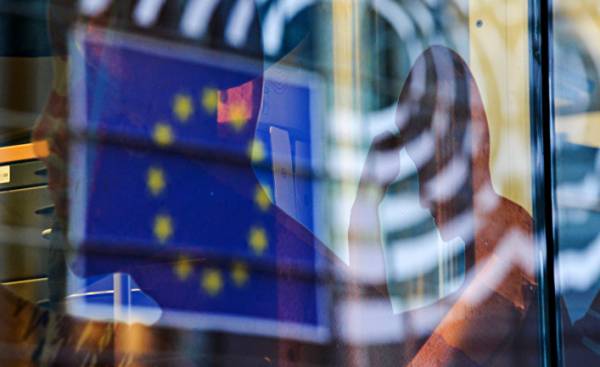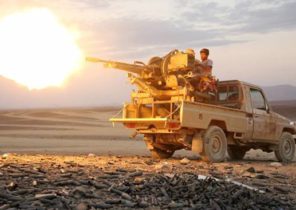
Sixty years after the signing of the Treaty of Rome, many see Europe as obsolete in the context of a world policy force. According to conventional wisdom, modern world politics is unipolar, and the only superpower is the United States. Or maybe she multipolar, because China, India and other able to challenge the Western powers. In any case, Europe’s role is secondary and continues to decrease. They say the EU is too weak to avoid wilting the face of Russia’s subversive activities, mass migration, rise of right-wing forces, the plan of a British exit, slow growth and almost complete lack of defense spending.
Signs of confusion to notice, of course, easy. Modern Europe is a complete mess, and the institutions and policies of its imperfect. Some of the threats facing the EU, more than real: slow growth and austerity, for example, within the Eurozone; others, such as the rise of right-wing nationalism and migration, — less, and the reasons I’ll touch on at the end.
Amid all the hyperbole and hysteria misses the main point. Today Europe is a truly unique force and will remain so, probably for many decades. According to the most objective indicators, it either can compete with or exceed USA and China the opportunity to demonstrate the whole spectrum of global military and economic power, as well as non-military methods of influence. Europe consistently deploys troops on the territory of countries that are its immediate neighbors and beyond. She manipulates economic power with skill and success, unparalleled in any other country or region. And its ability to use humanitarian weapon for the decline of other countries to change their behavior is simply unique.
If a superpower is called a political unit that has the ability to constantly demonstrate its military, economic and soft power on the transcontinental level and with quite good chances of success, Europe is, of course, that description fits. In addition, its power cannot be broken probably for another generation, regardless of the outcome of the current European crisis. Overall, Europe is “heavy duty invisible structure” of contemporary world politics. And here’s why.
Why you should consider Europe as a single player
Before turning to asset-specific military, economic and soft power of Europe, let’s dispel five minutes to the universal belief that Europe is too decentralized to act as a heavy duty political unit. Europe is not a sovereign state. However, in world politics it acts generally as a single force.
We ignore European unity at your own risk. Most observers see Europe as 28 separate countries — even when it creates geopolitical nonsense. To understand the reasons, consider one recent example: the alternative options of Russia’s foreign policy after the invasion of the Ukraine was caused by Western sanctions. Many predicted that the growing economic authority of China meant that the Kremlin will return, no doubt, to Beijing. In July 2015 leading Newspapers of Eurasia published the same story (it all started with the Agency “France-Press”), indicating that “China has become the largest trading partner of Russia, as Moscow in terms of Western sanctions is beginning to focus on the East in search of new opportunities in Asia.”
But Russian President Vladimir Putin quickly discovered the futility of the Russian reorientation towards Asia. And while the initial condition is, strictly speaking, true — China is the main trading partner, it accounts for only 14% of Russia’s trade. Three European countries — Germany, Italy and the Netherlands — more than 20%, while Europe as a whole — more than half. No realistic growth of trade with China could not compensate for the dominant position of the latter.
We consider Europe as a divided entity naively from a geopolitical point of view. Although the EU legislation does not impose any legal obligations for implementation of sanctions, Europe did just that — and paid more than 90% of the costs of policy responses of the West against Russia. European power and unity — the glue that over the past two years sealed this Western policy.
This is just one example of how, despite fragmentation, Europe effectively demonstrates strength in areas that are relevant in the context of global influence. Of course, European governments often disagree, sometimes loudly and publicly. However, policy coordination, formal and informal, allows the European governments to act as one to influence the outside world. Crucial three European coordination: common EU policy, coordination and tacit convergence of policies.
First, member States of the EU often share a formal mandate to cooperate. The government, as a rule, legally obliged to act collectively in the EU regarding the mechanisms of trade regulation, environmental protection, monetary sector, neighbourhood policy, development, enlargement, free movement of persons and border control. When there are serious disagreements, the country often resolve them through constructive abstention, according to principles of which some governments lay their problems and allow the EU to use its collective influence in areas of greatest importance to others.
Second, even when the EU legislation formally does not prescribe the unity, European governments often form “coalitions of the willing”. After 60 years in Europe has already established a continental network of informal norms, procedures and institutions, tacitly facilitate policy coordination. European foreign and security policy illustrate how this system of voluntary solidarity. Member States have taken a common foreign policy positions, which can be implemented by the high representative of the EU and a common diplomatic service, acting alone or with coalitions of national governments. The governments of EU countries to coordinate national positions in international organizations including the UN. For the success of this activity, the participation of all, without exception, of governments is not required. Again, constructive abstention allows governments to Express disagreement with the decisions in practice, however, moving — as happened, for example, with the recent decision for the former Yugoslavia and Libya, or the latest efforts to mitigate migration across the Mediterranean.
This coordination extends to collective European military operations. While there is no official mandate, missions often lack the official approval of the EU, as the interest of those wishing to take part in them. However, since the end of the cold war, European governments began, in one form or another, dozens of joint military operations. Such a deadlock situation, as the Iraq war of 2003, when European governments strongly disagree with those that hold the opposite political courses on significant global problem is extremely rare.
Third, even if the EU does not mandate or coordinating the response in policies, overlapping national laws, policies and interests of European States in most cases, produce compatible and complementary strategies. European governments have overlapping membership and legal obligations in international bodies. Almost all countries are members of NATO, which means the exercise of General planning and combat training and commitment to collective defence. They adhere to the same treaties governing the issues of asylum, human rights, environment, development and many forms of UN cooperation. All are in friendly relations with the United States. They have the same national Embassy. In matters non-military forces contribution to the common European influence in the world makes the ability of Europeans to teach foreign students, to set global constitutional norms and to monitor athletic performance — even if the EU does not coordinate all of this directly.
At a more fundamental level, all European countries are interdependent with the democratic and economic points of view, and the boundaries between them are largely undeniable, and often they are just invisible. Consequently, their coexistence does not involve any death threats against each other. Except in the very unlikely Russian attack on NATO, no other great power direct threat to their security can not imagine. This relatively favorable situation giving Europeans the opportunity to concentrate its geopolitical influence in other, less urgent issues. That is very different from, say, China, which should be ready for a possible military conflict with almost all its neighbors — Korea, Japan, Taiwan, India, Russia, Vietnam, Philippines and other countries in South and Southeast Asia, not to mention the United States — and to keep the army in reserve to maintain domestic order.
For these reasons, we must recognize Europe as a single superpower in terms of demonstration of military, economic and soft power — regardless of whether it formally as one or not.
The military power of Europe
Let’s start with “hard” military force. Although Europe’s ability to demonstrate the holding power to coerce other countries to agree to political demands can not be compared with the corresponding ability of the United States, they’re more active and more effective than any other world power. The oft-repeated phrase that the Americans came from Mars, Europeans from Venus, maybe spectacular, but public policy evaluates false.
The conventional starting point for defining military capabilities is money spent by each country on defense. The list in this regard headed by the United States, which accounted for over 40% of global military spending. In the second place, most analysts put China and more than two million of its troops, and then Russia, Saudi Arabia, UK, India, Japan, France, Germany and South Korea.
Here our geopolitical vision clouding again failing to consider Europe as a whole. If you combine European military activities, the second place is for her. European military spending accounts for between 15 to 16% of the world total. China ranks third with less than 10%, while Russia spends less than 7%, i.e. less than half of Europe.
At current growth rates, the annual military expenditure of China (or perhaps other emerging powers) will not exceed the European for at least several decades, and the us — within one or two generations, even in the optimistic growth projection for China.
Of course, this is not straightforward by comparison, since the decisions regarding the spending of the army of the government in Europe are independent from each other. The inefficiency is manifested in those cases when, say, France and Italy have its own aircraft carriers and maintain them in good condition separately. Studies, however, show that losses in efficiency due to decentralised production and procurement is a problem that plagues the United States and China, given their internal rivalries between the armed forces and politics lobbying local interests to gain support among his electorate — much less than you think. The most promising from the point of view of the reform of the realm (consolidation of the national military-industrial complexes) saves no more than 7% (about 14 billion euros). This is real money, but not enough of them to significantly change the relative international standing of Europe. Moreover, competitive procurement remains the effectiveness of European weapons, as evidenced by the fact that it consistently ranks first in the world in arms exports, outstripping even the US and Russia.
However, even the advantage of Europe in the field of annual military spending understates the established military advantages over any developing nation (as in the case of the United States). Suitable military capability is not just a function of military expenditure in any particular year, and the investment in the total volume of defense technology, logistical resources, training and accumulated by generations of experience. The average lifetime of the equipment of the US army in the range of from 10 to 25 years, and the service life of fighter jets like F-18, introduced immediately after the war in Vietnam would amount to almost a century.
To, on equal terms, to challenge Europe or the United States, China would need to surpass the West for the expenses of more than one year, but for decades — he was delaying the moment when he (under current trends) presumably will bypass the West, closer to the end of the 21st century. All of the scripts that provide for the rapid development of China (or other emerging powers), require an increase in military spending by at least 15% per year. This, in turn, means that China either have to triple the rate of economic growth (which is unlikely), or ten times to increase military spending as a percentage of GDP (strategy, bankrupt the Soviet Union, which you well know Chinese leaders).
The last reason for Euro optimism is that Europe supports long-term alliances. The United States and Europe — even in the era of President Donald trump as the show recently said encouraging words of Vice President Mike Pence and Ministers to address NATO partners — have constantly been in Alliance with each other and with 28 other NATO countries. This unit manages nearly 60% of global military expenditure. Europe, like the United States, supports worldwide partnership in the field of security and related database, as well as close relations with dozens of countries around the world.
Russia and China, by contrast, can only look to several allies. Beijing offers a modest program of military preparation and some help Cambodia, Afghanistan, Tajikistan, Syria and several African countries; partnering in the field of security of Pakistan; and has only one ally: North Korea.
These advantages are not just theoretical. The role of the European military is actually more than any other country in the world except the United States. Only Europe and the United States almost continuously since the end of the cold war unfolded, tens of thousands of combat troops outside its territories. In the last decade, Europe has placed on average 107 thousand soldiers a year on land, not counting the significant presence of the naval forces. China, for comparison, did not buy almost any militant groups abroad, while India did so only in the framework of UN missions. Russia’s recent actions were limited to a small intervention in the Affairs of its neighbors in the former Soviet Union, as well as air and naval support of its only remaining middle East ally.
Europeans do not just participate — they lead. They headed the military operations in Macedonia, Bosnia, Democratic Republic of the Congo, Chad, Somalia and Mali. They led the naval campaign off the horn of Africa and the Mediterranean. They conducted support missions and surveillance in Sudan, South Sudan, Guinea-Bissau, Libya, Indonesia, Iraq, Moldova, Kosovo, Georgia, Niger, the Palestinian territories, Ukraine and the Baltic States. They were headed for the U.S. mission, including in Lebanon. They played a significant role in missions under US leadership, particularly in Iraq and Afghanistan. In the latter case, more than 25% of the losses incurred by Western forces, accounted for 23 European countries. The world conferred on the United States the burden would have been completely different without all the European activities.
Despite a powerful army of a United Europe, many believe that the Europeans could bring to the world more good if their governments did not skimp on defense — highlighting, perhaps, the same 2% of GDP that NATO leaders promised a few years ago. And yet there is little reason to believe that increases in the number and quantity of material resources — or the level of centralization in the EU institutions would strengthen the military power of Europe. Although Europe has really suffered from the humiliation of turning to US with a request to refuel in Libya, it is difficult to understand why Europeans, according to many, needs to increase its military capabilities in all areas. The need for replenishment did not affect the outcome of the situation in Libya and is unlikely to be affected anywhere else, since the beginning of 1990-ies the United States and Europe agreed on all military interventions, except for one. (The only exception was the second war in Iraq). It’s hard to come up with at least one recent case when a significant group of European States (not to mention the majority) are unable due to the lack of military power to start desired a strong military or a diplomatic mission.
Exclusive economic influence of Europe
Europe has an impressive military assets, but the main driving force of its global influence lie in the other. Europeans tend to be skeptical of the use of military force in the presence of choice and therefore decided to specialize in non-military controls of public Affairs. Here their capabilities often exceed the capacity of the United States.
The comparative advantage of Europe as a civilian power is as important to global peace and security, as the military power of the United States. It should be noted that a century ago the most important resources of a world power is considered the military force. But this factor is hardly decisive. It is too costly and unreliable in the context of potential benefits. Since the Korean war, direct conflict between the “great powers” arose. Less common and less costly and small wars. Participating in them, the great powers lose more than win. The situation in Syria is depressing, but is an exception to the much broader trends aside from inter-state wars.
Currently, countries try to use non-military methods of resolving the most important problems of global scale: not only territorial, but also concerning economic interdependence, development, degradation of environment, global health, human rights, migration and even terrorism and crime. One of the most important aspects of a non-military capacity is the economic power. It is hard to imagine that the armed forces can really help solve most of these problems. Despite the fact that Europe supports effective army, it would be wiser to specialize in the field of the power that the US can’t demonstrate.
Europe has one peculiar feature — its unique economic strength. To force others to make political concessions, European States manipulate access to its markets and create conditions for economic aid and exchange, and use legal and institutional dominance. Thus, the main source of European economic power are becoming a commodity economy.
The conventional wisdom again is misleading. According to a recent poll of citizens of 40 countries, almost the whole world believes that China is the dominant economy, or that the palm is still in the hands of the United States. Only 5% consider the EU as a “leading economic power”. However right they. Terms of the simplest units of economic power — nominal GDP — the EU is almost proportionate to the United States and 63% by-pass China.
It will surprise those who have read numerous reports that the highest GDP in the world belongs to China. This assessment is misleading because it uses “purchasing power parity” — a statistical measure developed by the international development agencies to measure individual levels of poverty and wealth in developing countries with cheap services and labor. Based on purchasing power parity GNP statistics intentionally overstates the income of developing countries in such a way as to exaggerate the value of international exports and imports, high technology, advanced weapons systems, foreign aid and most of the other elements of the international economic influence. A more appropriate standard of measuring the total economic impact is its nominal GDP. From this point of view, China won’t overtake the EU or the US for another several decades.
Recent headlines about the dominance of China and the United States are confusing because again see Europe not as a unified whole, but as a 28 separate States. In fact, the EU is the second largest economy in the world and, more importantly, it is the largest trader of goods and services.
Because exports can be a source of vulnerability and strength, more focused unit of power would be to depend on foreign markets. The stronger the country’s dependence on trade, the less powerful she is. Europe is a little more dependent on trade than the United States, but significantly less than China.
What about the recent increase in the level of foreign direct investment (FDI) of China, which caused so much attention from the media? As it turns out, the leading foreign investor remains Europe.
Needless to say, if you sell natural resources in sub-Saharan Africa, Latin America or Australia, Chinese investments play an important role. In other cases, it should be remembered that the majority of global investments still occur between developed countries, where the role of China’s more than modest.
However, even this situation understates the importance of Europe as an effective economic power does not only depend on the relative size of its economy, but also of the average income per capita. The poorer the population, the less resources can remove the government. In developing countries, the development often is the most basic requirement, the costs of foreign policy is a luxury, and Autonomous technological level is low. Although the total income of China in the world, his income per capita ranks 74th (between Saint Lucia and Gabon). According to the Israeli scholar Azar gat, the governments of developed countries such as European editor of the foreign policy goals of three to four times more than the governments of developing countries like China. One example is the ability to expose the community to the tax. The EU income as a percentage of GDP is almost twice higher than that of China.
Europe does not hesitate to use its outstanding economic position. In recent decades, the expansion of the EU — mainly due to perceptions of economic benefit — was the most efficient, cost-effective, political tool of influence in the hands of any Western country. For 60 years, the EU has expanded from 6 to 28 member countries, simultaneously encouraging them to conduct a democratic, legal and market reforms. Despite the fact that to date, the expansion has become more difficult from a political point of view, it continues in the Western part of the Balkan Peninsula.
Europe continues to maximally use its regional market power through a “neighborhood policy” and bilateral agreements with neighbouring countries, starting in Morocco and ending in Moldova. She supports the world trade organization and impose reciprocal conditions on its preferential trade agreements. Internal visa-free travel and migration are an important issue for a mutually beneficial exchange in the negotiations with the neighbors. To the chagrin of American and Chinese companies, Europe holds a leading position in the field of global regulation, forcing trading partners to accept relatively high European production standards — a phenomenon that Professor at Columbia University Anu Bradford calls hegemonic “effect of Brussels”.
Other economic instruments in Europe is less visible but no less important. One example is international assistance. The share of Europe accounts for 69% of global official aid to development (ODA), the United States and 21%, and China and less. The bulk of support Europe, as the United States, offers in the form of grants, while China provides as a rule, ODA and export credits and government loans — financial flows, which must be repaid, and therefore are not as valuable to the recipients. But even if you consider both, in financial terms, Europe will still dominate the US and China.
European international aid played a crucial role in advancing the strategic goals of the West. For example, 90% of Western assistance to Ukraine and trade with it is the annual economic aid to Europe in the amount of from 10 to 15 billion euros, and the promise of free trade and energy agreements. Ukraine continues to face tough times, but without the economic commitment of the Europe government in Kiev would surely bankrupt and returned to the Russian geopolitical sphere.
Another example of a unique and effective tool of European economic power is the imposition of economic sanctions. The illustration is the same Ukraine. As in the case of trade policy and aid policy, Europe accounts for 90% of the cost of the recently introduced Western sanctions against Russia. It reflects a unique influence of Europe as the largest trading partner not only in many States of the former Soviet Union, but also almost all countries in the Middle East and Africa. In the world there is hardly sanctions imposed without the active participation of Europe. The United States, by contrast, are unlikely to have trade relations with most of these countries, but because they have little or no ability to impose effective sanctions on their own. Washington, for example, for 35 years continuously imposed sanctions on Tehran, but the special effects are not achieved. And after that, in 2013, under severe sanctions signed by Europe, Iran for two years, agreed to a nuclear deal.
Amazing non-military methods of Europe
The so-called “soft power” measures the ability to advance foreign policy goals through the dissemination of ideas and manipulations, as well as information and institutions that help to encourage other countries to certain actions. This force is used in a variety of ways, and the EU is among the most effective manipulators of the world.
One of the important applications of soft power is the creation of attractive for the accession of international organizations. Modern Europeans are leading supporters of global and regional institutions. Their interest starts with the EU and its agreements with regional neighbors, but decisive influence of Europe applies to the issues of economic interdependence, human rights, environment, development and health on a global scale. A typical example is the United Nations: despite the fact that the United States, as a rule, take credit to be the largest member of this Association, the generalized contribution of Europe will be much more powerful. Without European pressure institutions like the International criminal court, the world trade organization and other global institutions could not exist in its current form. Imposing reciprocal conditions in exchange for membership or collectively, by promoting the observance of the rules, other governments have become committed to the rules set by the European institutions to influence the policies of individual States.
Europe also uses more sophisticated techniques use “soft” power. One of them is education. Europe is one of the two superpowers, giving the formation a special place. 27 of the top 100 universities in the world are in Europe, in the United States — 55 in Russia, and China — none. Europe surpasses the United States in the field of education of foreigners, taking twice as many students compared to the States and 10 times more students in China to foreigners.
There is every reason to believe that a significant impact of the opening of European Universities for foreign citizens. The legal specialists note, for example, that existing in most new national constitutions values and state institutions do not reflect the methods of the United States or China, unlike in Europe. These include social security law, human rights recognized at the international level, parliamentary government and monetary restrictions in your policy.
Beyond the purely political values, Europe has secured the respect of the rest of the world thanks to the social and cultural values, and peculiar only to her way of life. Among the two dozen major tourist destinations, more than half European. More difficult to understand is the dominant player in Europe, appearing in almost all the polls. Last year, for example, Forbes magazine interviewed 40 thousand people around the world, asking what countries are the most “respected”: the generalized measure of happiness, purity, absence of corruption, tolerance and other aspects. In the top 15 countries were European, the USA ranked 28th and China 57.
What about the language? Europeans and here enjoy stable benefits as a second languages, mainly European. English is certainly the predominant second language across the planet, but play an important role and the French with the Spanish. The languages of the other great powers, particularly Chinese and Russian, have very limited impact.
Even in South-East Asia, Chinese as the second language occupies a low position outside the communities of the Chinese Diaspora.
And pop culture? The United States is, of course, have one big advantage. Each of the 20 best ever made in the world of movies come from Hollywood. Another form of mass events with similar global prestige is a sport, and Europe is a leading global sports superpower. Five of the seven most visited city in the world — football, basketball, cricket, field hockey, table tennis, tennis and volleyball in Europe are developed to a higher professional level than in the United States or China. The most prestigious of them — the European professional football generates more revenue and is more popular worldwide than any other sports. Cash collections from the sale of football tickets are twice the revenues from games of the NFL and American football in the United States combined. The dominant position of Europe it is also evident at the Olympic games.
At the summer Olympic games Europe gets more medals than the US, Russia and China put together; for the winter — more than any other country.
Why Europe fails to avoid a crisis
The main factors of global influence — military capacity, nominal income, and income per capita, trade competitiveness and investment attractiveness is characteristic of symbolic ideas and institutions change much more slowly than is reported in the headlines. Modern Europe is a hidden world superpower to rival the US and China, and in many cases superior to them. She has the resources necessary to preserve this status for decades and future generations.
Today, official and unofficial cooperation between the European States is functioning so reliably that only in rare cases the rest of the world might see failures. Europe, like other superpowers, often distracted by seemingly intractable internal disputes and crises. Among them, the migration of the radical right, Pexit, the revival of Russia and slow growth under the domination of the Euro. However, these threats are not as scary as they seem at first glance.
Right-wing parties are unlikely to win any continental political system, not to mention provoking the mass exit from the EU. In these political systems coalition government and referendums are rare. In the Netherlands, the eurosceptic party should be excluded from government. In France, marine Le Pen has little chance to win in the decisive second round of the upcoming presidential elections and National Assembly will leave only two members of her party. Skeptical towards Europe parties that have power in Hungary and Poland, but refrain from suicidal step of secession from the EU.
British leaders strongly declare the advance due to “hard Bracito”. However, the plan negotiations, Prime Minister Theresa may implies the preservation (under another name) of practically all existing types of cooperation with the EU, in addition to future of free movement of persons. (foreign trade policy remains in limbo, perhaps as a bargaining chip.) One important example is NATO. Britain intends to retain its defense Alliance, and no reason to expect changes in its active participation in the military “coalition of goodwill” virtually none.
The immigration crisis is on the wane. EU and national policies of its members successfully reduced migration by a third from its peak in 2015. To do this would have been possible without the leadership of Brussels, and the new round of the General EU policy is supposedly already in development. In Ukraine, where just a few years ago for 18 months, died 10 thousand people, led by Europe strong Western policy of aid, sanctions, military readiness and diplomatic activity helped to reduce the mortality to a minimum.
Perhaps the most worrisome future threat from slow growth and austerity in the Eurozone. The EU without the Euro as we know it, could be more popular and more stable than today. However, the Euro still looks stable, and the growth rate increase. As with other crises, Europe may emerge.
Whatever the result, they surprisingly had little effect on Europe’s status as a global superpower. Most of the major official institutions of Europe — including the single market, environmental and other government regulation, a common trade policy, agricultural policy, international aid, common border controls remain by and large intact. But they are not the main targets of the critics of skeptics. Other European policies — including in the field of foreign, defence, counter-terrorism policy, the fight against crime, international aid, sanctions, diplomacy, and development policy — require only informal coordination “coalition of goodwill” or tacit cooperation. The recent sanctions against Russia and Iran show that European governments act decisively, even if they distract the problems of the crisis. All these political lines will take possible economic reforms, further centralization or decentralization of decision-making, increase defense spending or the adoption of any other available in Europe policy prescriptions.
No sensational headlines to distract us don’t have. Sixty years ago, when European leaders met for the signing of the Treaty of Rome, one of their common goals was strengthened global position of Europe. They succeeded, and to doubt that they will continue in the same spirit, is not necessary.






